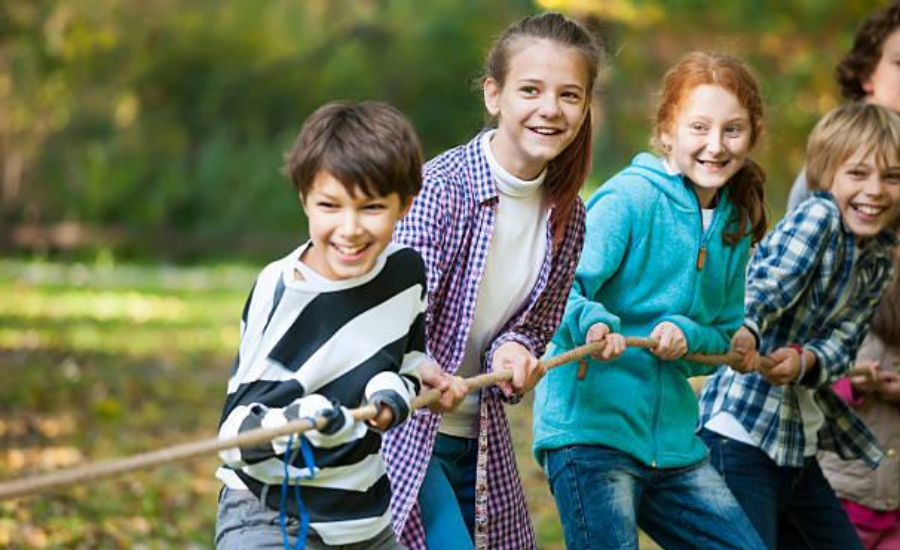Summer camps are the perfect environment for kids to grow, learn, and build lasting friendships. One of the most important life skills they can develop at camp is teamwork. Working together not only fosters social connections, but also helps campers build confidence, leadership skills, and a sense of responsibility. To truly make the most of the summer camp experience, it’s essential to integrate activities that focus on cooperation and group effort. By creating structured Teamwork Summer Camp Activities, camp leaders can encourage campers to learn how to support one another, communicate effectively, and work together toward common goals.
In this article, we’ll explore several effective Teamwork Summer Camp Activities that can be easily incorporated into your camp’s program, and explain how they help promote a sense of community and collaboration among campers.
The Importance of Teamwork in Summer Camps
Before diving into specific activities, it’s important to understand why teamwork is such a vital part of the summer camp experience. Teamwork helps campers learn how to interact with others in productive ways. Whether it’s solving a problem together, relying on one another in a game, or collaborating to complete a task, these shared experiences teach campers the value of cooperation.
Moreover, teamwork helps campers develop social skills, such as communication and conflict resolution, which will benefit them throughout their lives. As they collaborate with others, they also build trust and respect, allowing friendships to form more easily.
1. Group Relay Races
Relay races are a fun, energetic way to encourage teamwork among campers. In these races, each camper is responsible for completing a portion of the course, which means that the entire group must rely on each member to do their part.
How to Organise:
Create a simple race course with different stations where campers perform various tasks. This can include running, crawling, jumping, or even solving puzzles.
Split campers into teams and have them line up. The first person from each team completes the first station and then tags the next teammate, who completes the next station, and so on.
The team that finishes the race first wins.
Relay races help campers understand that their individual actions directly impact the success of the team. It also requires them to cheer on and support their teammates, fostering a sense of community.
2. Team Scavenger Hunt
A team scavenger hunt is a fun and engaging activity that encourages collaboration, problem-solving, and resourcefulness. This is one of the best Teamwork Summer Camp Activities because it promotes communication and coordination while letting campers explore the campgrounds.
How to Organise:
Create a list of items for campers to find around the camp, such as specific leaves, rocks, or other natural objects.
Divide the campers into teams and give them a set time limit to find as many items on the list as possible.
The team that finds the most items or completes the hunt first wins.
Not only do scavenger hunts get campers moving and working together, but they also require teams to strategize and communicate effectively. Some team members may excel at finding certain items, while others focus on organising the list, making this a true group effort.
3. The Human Knot
The Human Knot is a classic camp game that encourages communication, problem-solving, and cooperation. It’s an excellent way to build trust and teamwork among campers because it requires everyone to work together in close quarters.
How to Play:
Have campers form a circle and put their hands into the center. Each camper grabs the hand of two different people, creating a “human knot.”
Without letting go of each other’s hands, campers must work together to untangle the knot and return to a circle.
The goal is to untangle themselves completely without breaking the chain of hands.
This activity requires campers to listen to one another, work together, and patiently solve the problem as a group. It’s also a great icebreaker for new campers who may not yet be comfortable with their peers.
4. Capture the Flag
Capture the Flag is a traditional summer camp game that promotes strategy, teamwork, and physical activity. In this game, campers must work as a team to capture the opposing team’s flag while defending their own.
How to Organize:
Divide the camp into two teams and designate each team’s territory.
Each team hides their flag somewhere within their territory.
The objective is to find and capture the other team’s flag and bring it back to your side without being tagged.
If a camper is tagged while in enemy territory, they’re sent to “jail” and can only be freed by a teammate.
This game promotes teamwork by requiring campers to communicate and work together to devise strategies for defense and offense. Capture the Flag also teaches campers the importance of supporting their teammates and relying on one another for success.
5. Tug of War
Tug of War is a simple yet powerful team-building activity that relies on strength, coordination, and group effort. This game teaches campers that they must work together if they want to succeed.
How to Play:
Divide campers into two teams.
Have both teams hold onto opposite ends of a sturdy rope.
On a signal, each team pulls the rope, trying to drag the other team across a marked line.
The team that pulls the other team over the line wins.
This game is a great way to reinforce the idea that teamwork is about pulling together—both literally and figuratively. Campers must synchronize their efforts and encourage one another to win.
6. Campfire Story Relay
A campfire storytelling relay is a quieter, creative activity that encourages teamwork in a different way. Instead of relying on physical strength or problem-solving skills, campers must work together to build a story.
How to Organize:
Gather campers around the campfire and have one person start a story with a single sentence.
The next person adds a sentence to the story, and so on around the group, until the story is complete.
The goal is to create a fun and cohesive story by the time everyone has contributed.
This activity promotes teamwork by encouraging campers to listen, think creatively, and collaborate with one another to build something unique. It also allows quieter or more introverted campers to participate in a low-pressure group activity.
7. Team-Building Obstacle Course
Setting up an obstacle course is a fantastic way to get campers working together and supporting one another through physical challenges. Each part of the course should require teamwork in some form, whether it’s balancing, lifting, or solving puzzles.
How to Set Up:
Design an obstacle course with different stations that require teamwork, such as a rope swing, a balance beam, or a puzzle-solving station.
Split campers into teams and have them go through the course together, helping one another through each station.
Teams that complete the course the fastest, with all members finishing, win.
Obstacle courses promote teamwork by making campers rely on one another to complete the challenges. It’s a great way for them to build trust and communication skills while having fun.
Conclusion
Integrating Teamwork Summer Camp Activities into your camp’s program is a great way to foster a sense of unity, collaboration, and community among campers. Whether it’s through energetic games like relay races and Capture the Flag, or more creative activities like storytelling relays, these exercises help campers develop essential life skills that will serve them well beyond their time at camp. By emphasising teamwork, you can ensure that campers leave with not only fond memories but also stronger relationships and a greater sense of confidence in their ability to work with others.
FAQs
1. Why is teamwork important at summer camps?
Teamwork is important at summer camps because it helps campers develop social skills, communication, and collaboration. It allows them to connect with their peers, build friendships, and learn how to work together to achieve common goals.
2. How do summer camp activities promote teamwork?
Summer camp activities promote teamwork by encouraging campers to collaborate, solve problems together, and support one another. Activities like relay races, scavenger hunts, and obstacle courses require campers to communicate and rely on each other for success.
3. Can teamwork activities be adapted for different age groups?
Yes, teamwork activities can be easily adapted for different age groups by adjusting the difficulty level of the tasks or games. For younger campers, you can focus on simpler activities, while older campers may enjoy more challenging or competitive tasks.
4. What are the benefits of teamwork at camp?
The benefits of teamwork at camp include improved communication, trust, leadership skills, and a stronger sense of community. Campers who engage in teamwork activities are more likely to develop lasting friendships and gain confidence in their abilities to work with others.
5. How can camp counselors encourage teamwork?
Camp counselors can encourage teamwork by selecting activities that require collaboration and ensuring that all campers are involved. They can also emphasize the importance of communication and support, creating a positive environment where teamwork is valued and celebrated.
Stay In Touch For More Updates And Alerts: Discover Tribune




